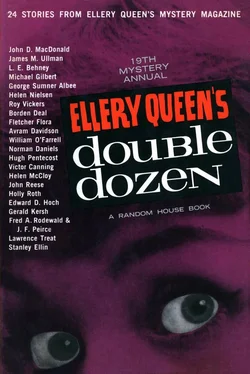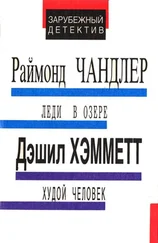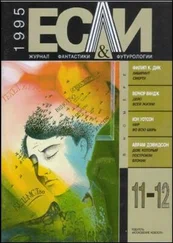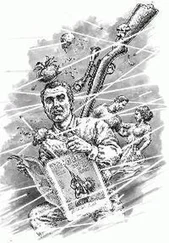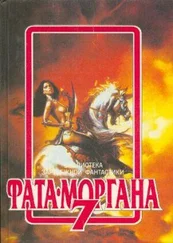She shivered, not from cold. What would Tom do if he ever guessed the truth about her? He was so simple, so normal. He had no morbid desires. He could never be made to understand a person who did...
Her flying feet brought her to a squalid neighborhood. The moon had risen. Its cold light was pitiless to the diseased buildings. Peeling, eczematic paint. Scabrous, suppurating brick. Cramped, arthritic fire escapes. Filth everywhere — on grimy windowpanes, in trash cans and gutters, on worn steps before dark doorways. She looked up at a sign: Q Street.
She thought she saw darkness move in one of the doorways. Now she was really afraid. This was like stepping into the elevator alone and hearing a step behind her and then turning to see a tall, strong boy with a bicycle chain in his hand.
But she couldn’t go back. She had come so far and she didn’t know when she would have the chance again.
Once more the darkness moved. And this time she saw the gleam of a knife.
“Oh, no! Please...” Ella could barely speak.
And then, faintly, it came — that sweet, memorable, enticing fragrance.
Her fear melted.
“Oh, please let me go in! I must, I must!”
The boy was young, surely under twenty, but he was looking at her with the ancient contempt of panderers for the vices they live on. “You goin’ in Number Ten? What’s the word?”
Her voice quavered over the word a friend had whispered to her weeks ago — a word salvaged out of the faraway past. “Speakeasy,” Ella whispered.
“Okay.” His thumb jerked toward the last house in the row behind him. Silently he slid back into his doorway. A guard. Of course. They would have to take such a precaution.
Outwardly, Number Ten was just another dingy tenement — street door open, doorbells and letter boxes in a vestibule, inner door locked. She had been told to ring the bell marked 3A. A wheezing mechanism, one of the earliest forms of automation, opened the inner door.
She drew her coat away from the greasy walls as she climbed the stairs. If Tom could see her now...
There were no bells on the third floor. She knocked on the door marked 3A — three short knocks and two long. It opened on a chain. A bloodshot eye looked at her through the slit.
“Yeah?”
She stammered a little as she gave the second countersign. “J-joe sent me.”
The door swung open. She darted inside. In an instant the door had slammed behind her.
The room was large and relatively clean. Waiters moved among small tables covered with red-and-white checked cloths. At the far end was a long counter where people sat on stools. It would be cheaper at the counter, so she found a vacant stool.
The counterman wiped a place in front of her. “Kind of young to be here, aren’t you, lady?”
“I’m of voting age.”
“Yeah?” He was sadly skeptical. “What’ll it be?”
She moistened dry lips with her tongue. “If you please — if you could let me have...” It was hard to say the words. But now the fragrance came again, stronger, more enervating, but irresistible. She threw shame to the winds.
“I want a slice of real bread!”
The sadness in his face deepened. “And I suppose you want real butter, too? Butter made from cream that comes from cows. Filthy, smelly, old cows covered with mud and straw and dung and flies.”
“Yes... yes, I want real butter.”
“Are you sure? Don’t you ever read ads? Even if you can’t read, you must listen to commercials! Wouldn’t you rather have Low-price Spread, test-tube fresh, synthesized in General Nourishment’s fully automated laboratories? A spread that’s not just clean, but sterilized. It can be kept fresh forever because no mold or bacteria can grow in it. Not enough nourishment for a single bacterium. Yet it will fill your stomach and keep you from feeling hunger.”
She lowered her head. She couldn’t meet his eyes. “But I want real butter. And real jam, made with fruit and sugar and nothing else, not even a preservative.”
“That’s going to cost you plenty.”
“How much?”
“One hundred dollars for the bread. Twenty-five for a pat of butter. Thirty for two ounces of jam.”
“I have cash.” She clawed open her purse, counted out $155 in small bills, and tossed them on the counter. “I’ve been saving for months.”
He scooped up the money, then paused as he noticed her wedding ring. “I don’t often try to help the girls who come here, but you’re married and — you’re so young. You do know what you ought to do, don’t you? Pick up that money and walk right out of here as fast as you can before it’s too late. Go straight home to your husband and heat up one of those delicious frozen Tasteegood Teevee Dinners manufactured by General Nourishment. Nylon meat; chlorinated, aerated cotton bread; dehydrated, homogenized potatoes; synthetic, chlorophyll vegetables. Will you do it?”
“No.” Ella’s voice was firm.
The counterman sighed. “Do you know what’s in this bread you’re asking for? Flour. Real flour. And that’s made by taking two dirty old stones and grinding up the fruit of a weed called ‘wheat’ that grows in soil — rightly named — soil, mud, earth — the earth that both human beings and animals walk on. Have you ever tasted the stuff? Or is this your first—”
He faltered as his gaze went beyond Ella. She turned. Another man was standing behind her — a short, fat man with a smooth face and slitted eyes.
“Preaching again, Marvin? That’s not what I pay you for! Take the little lady’s money and give her whatever she wants. If I catch you trying to reform my customers again—”
He patted Ella’s shoulder. She shrank from him, but a moment later all that was forgotten. There, right in front of her, was a slice of real bread, still warm from the oven, crusty and munchy between her teeth, tasting of ripe grain and sunshine and rain from heaven. And running with real butter, golden, melting, scented with clover. And the jam was made of real black currants and real sugar, sweet and tart.
She didn’t care what the commercials said. Jam synthesized from carefully selected peanut shells and old shoesoles did not taste like this. Any more than what the Kremokup people put in their Instantkaff tasted like real cream in real coffee — any more than the orange powder which General Nourishment had christened Tango-Seville tasted like juice from real Seville oranges.
Recklessly Ella ordered another slice of bread.
A man sat down on the stool beside her. “A steak, please,” he said brazenly. “A real steak, cut from a steer, and broiled rare.”
“Anything with it, sir?”
“Yes, real potatoes, French fried, and hearts of lettuce with chives and Roquefort dressing.”
“You know what that will cost you? Two thousand dollars.”
“Okay.”
Ella was impressed. This man was no member of the consuming classes. They didn’t have that kind of money. She stole a glance at him and knew, instantly, that she had seen him somewhere before.
But where? He couldn’t be a friend of Tom’s. All Tom’s friends, like Tom himself, were simple consumers. Could she have met this man at one of her mother’s big parties? Her mother had a great uncle who owned some stock in General Transportation. Now and then a few stockholders and scientists turned up at her mother’s parties. But if this man had met Ella at her mother’s, he might recognize her now. He might tell her mother he had seen her here. Good God, he might even tell Tom—
She ought to leave now, at once, before the man noticed her. But she couldn’t, not until she finished eating that second slice of bread and butter.
She risked another glance at the stranger. He looked important. A lean, craggy face. Dark eyes sunk deeply under black brows. Even his clothes... She had never seen real wool, but the suit he was wearing didn’t look like any synthetic she knew. He even wore a ring on the little finger of one hand, a massive ring that didn’t seem a bit like the “Jooljunk for He-Men” advertised on TV. Could it be real gold?
Читать дальше
